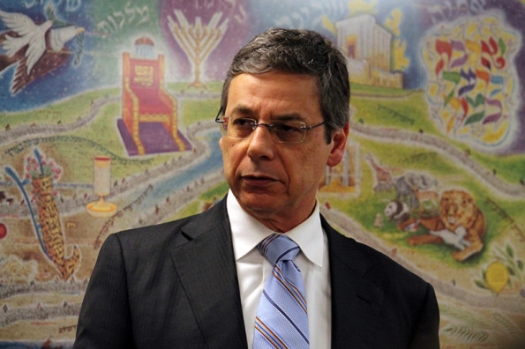
Former Israeli Ambassador Speaks at Chabad
Danny Ayalon, former Israeli ambassador to the United States, spoke Tuesday night on the current state of the Middle East, saying the political importance of the region extends beyond the Israeli-Palestinian conflict. Ayalon spoke to an audience of more than 80 students at the Tannenbaum Chabad House at Northwestern University near Chicago, Illinois.
The event, which was sponsored by Chabad and Wildcats for Israel, featured the Israeli diplomat and politician, who served as Deputy Foreign Minister and a member of the Knesset, Israel’s national legislature, from 2009 to 2013. Since leaving politics, he has written for Israeli and international newspapers such as The Jerusalem Post and The Wall Street Journal.
“We were contacted by Danny Ayalon’s office on Tuesday because he was in the Chicago area and wanted to speak to Northwestern students,” said Weinberg senior Joel Rabinowitz, president of the Chabad House executive board. “It’s great to have this exposure to a perspective on the Middle East. It’s a really important topic that I think students should be aware about.”
Jonathan Kamel, president of Wildcats for Israel and a former Daily columnist, said the group was excited to bring Ayalon to campus.
“We got the speaker very suddenly and unexpectedly,” the Weinberg sophomore said. “Our organization’s mission is to promote the U.S.-Israel relationship on campus, so we’re very happy about the event.”
Rabbi Dov Hillel Klein of Chabad House said he was “pleased with the turnout.”
“It’s important for people to have a deeper understanding of what’s going on in the Middle East today,” he said.
Ayalon served in Israel’s Foreign Service for more than 20 years and has been vocal in publications about his belief of the U.S. and Israel being allies. Both nations are in agreement over nuclear sanctions in the Middle East, he said.
The precarious climate, he said, is due to the “silent majority.”
“Over 100,000 victims are being slaughtered in Syria, and there is nothing the international community is doing,” Ayalon said. “The international community is cynical, hypocritical but mostly ineffective. … It’s always too little, too late.”
He went on to talk about religion’s role in various conflicts in the Middle East.
“The conflict in the Middle East is far greater than the Palestinian-Israeli conflict,” said Ayalon. “The problem is the Sunni-Shiite divide. … There is no tolerance among Muslims. Islam is a respected religion, but all terrorists today are Muslims.”
Ayalon predicted that the current uprising in the Middle East will lead to a complete political turnaround.
“We’re just at the beginning of a very different political landscape,” he said. “A reconfiguration of political order back to pre-World War I.”
Ayalon was also firm in his view that the United States should refrain from getting involved with Syria in the aftermath of the Syrian government’s use of chemical weapons against its own people.
“I wouldn’t advise the United States to intervene in Syria,” Ayalon said. “If there’s someone who will make a difference, it’s the Arab League, but they have not lifted a finger to help.”
Ayalon said he believes that reaching peace in the Middle East is possible but will require cooperation in a time when a clash of interests and values are at play.
“Even at peacetime,” he said, “make sure you are the lion and not the lamb”.












